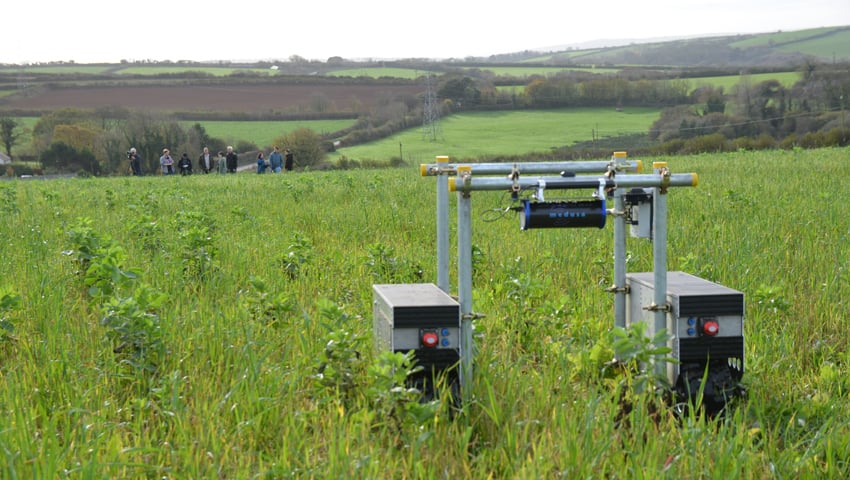A Cornish farmer is trialling different approaches to improve soil health while reducing erosion and flooding – and using robotics technology to help him measure his success.
Working in a group of farmers across Cornwall, with Innovative Farmers and Farm Net Zero, Malcolm Barrett trialled methods of sowing maize that minimise ploughing. This including using strip till machinery that disturbed the soil in strips, rather than ploughing the whole field.
Maize needs a fine seed bed to establish and is easily outcompeted in its early growth stage. This means heavy ploughing takes place to help give the crop the best chance, but this can lead to degraded and compacted soils that risk polluting rivers via run-off.
This is a particular problem in the southwest where there’s a lot of maize grown to feed cattle, and the degraded soils typical to this crop can cause a real problem when autumn rain hits and washes soil onto roads and into rivers.
Since reducing the use of the plough on his farm via a variety of min till methods, the trial – supported by Innovative Farmers – has helped Barrett see dramatic improvements in his soil with less flooding and more worms.
Now the University of Plymouth has partnered with the trial as part of its ongoing research in the potential for agri-tech innovations to support land and water management.
The university is pioneering the development of sensors that estimate soil organic matter and moisture levels, using natural radioactivity signals that come from all soil minerals. This can provide data to help farmers see how effective their practices have been across a field and help them to plan how to better manage soils and water and improve productivity.
The research aims to show how the sensors can give the farmer a full picture of a field instantly on-site using hundreds of datapoints, rather than sending away a few soil samples to a lab, waiting for results, and then hoping those samples are representative of the whole field.
Sensors can be carried around the field to collect data, but this has now developed into cutting edge technology where the sensors operate on a robotic platform. The robots can be programmed to travel more slowly and accurately than walking, creating more consistent data and reducing work for the farmer or advisor.
Barrett said, “We’re learning more about what the soil can do for us and what we can do for the soil. It’s helping everyone by helping the environment and we’re getting huge benefits on our farm too. If we can understand our soil and our crops more, we can farm smarter by targeting our approach. Having thousands of data points from the robotic sensors helps to build a whole picture – then we can see if there’s certain areas that need attention and single out management practices that work.”
Professor Will Blake, Director of the Sustainable Earth Institute at the University of Plymouth, said, “This trial has meant we can get our science out of the lab and test it in a real-world setting, feeding back into other research programmes we’re working on. In this field lab, we’re using robotics to deploy soil assessment solutions that the world could take on. It’s great to be working with real farms – codesigning research questions with farmers is really important as it makes the technology we develop genuinely useful.”
Barrett has also just signed up as a demo farm for a separate project called Agroecology at Scale where his farm will be used to demonstrate nature-friendly practices and inspire other farmers, so this sort of evidence and technology is extremely helpful.
The university hopes that this project will allow them to further develop the tech using other robotic platforms to explore biodiversity and crop factors as well as soil health. They are also embarking on preliminary work using robotic dogs, which could analyse thousands of photos – taken of hedgerows and other hard-to-reach places – using AI tools to measure biodiversity.
